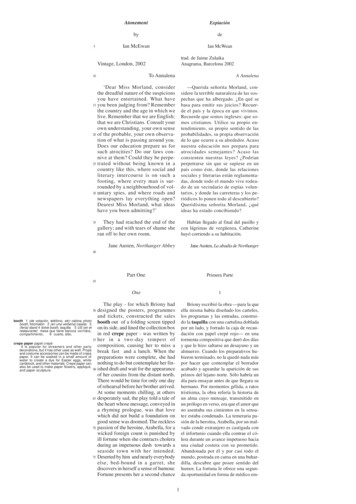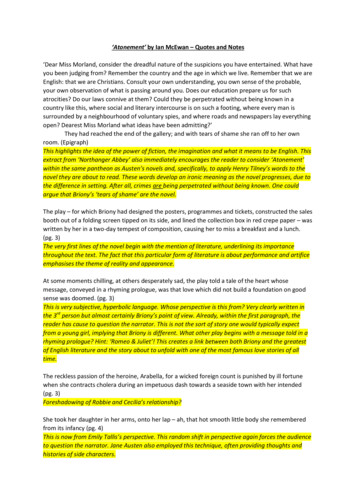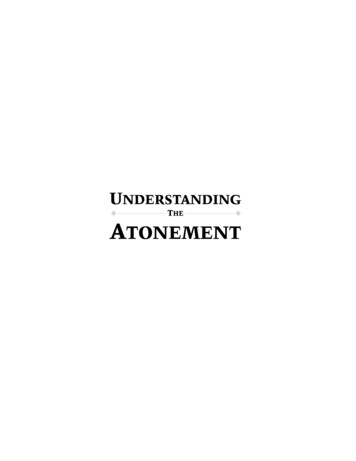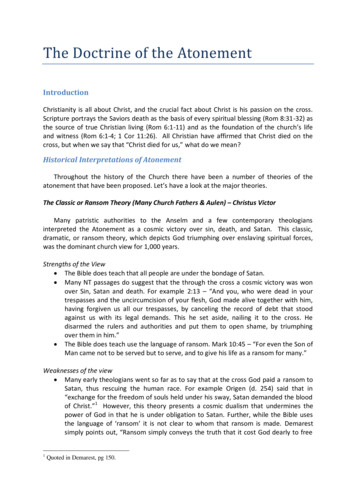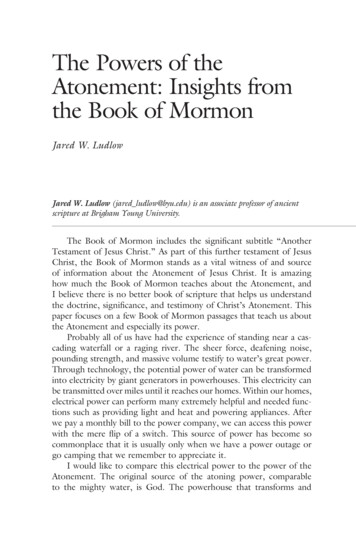
Transcription
International Journal of Humanities Social Sciences and Education (IJHSSE)Volume 4, Issue 2, February 2017, PP 88-99ISSN 2349-0373 (Print) & ISSN 2349-0381 09www.arcjournals.orgSuperego Guilt, Redemption and Atonement in Khaled Hosseini’sthe Kite RunnerHesham KhadawardiAbstract: The most elaborate theme and which is the central building block in The Kite Runner is that ofguilt.1 This paper argues that transgression and ultimate transvaluation is essentially the goal of the author, andthat, he aims to achieve this through the protagonist, Amir. This theme is closely interwoven with yet anotherprominent one—the theme of redemption. The starting point of this paper begins with a postulation that theinterlocking of these two themes is inseparable since the outcome of redemption is as a result of a choice madehitherto before it. Although a truism that an ominous offence is firstly committed and subsequently followed bysome kind of remorse which in this paper is referred to as redemption, the paper examines Amir’scharacterization and character as a clear manifestation of these recurring motifs. For the purpose to addressthe aforementioned problems, interrogation is made in this paper at careful understanding of some key issues.For example, in what ways are they (guilt and redemption) manifested? What are the triggers of guilt andsubsequent redemption? What is the role of betrayal as harbinger of guilt and redemption? To what extent dointerventions by the guilt address the issue of guilt? This paper will attempt to answer these questions. Althoughthere are emerging motifs, such as man’s humanity to man, bigotry, master and slave relationships, coming ofage, prejudice, this paper will remain focused on betrayal, guilt and redemption.Keywords: Redemption, guilt, betrayal, treachery, atonement, kite-running1. INTRODUCTIONThe Kite Runner written by Khaled Hosseini2 (2003) an Afghan-American author is probably his mostfamous work and a masterpiece of antithesis. The novel sold millions of copies worldwide, receivedcritical acclaim and been classified as one of a classic. Among the very few who argue that the novelis not a superior one and that its importance will face away by time is the aging American criticHarold Bloom. Bloom, in this regard argues that The Kite Runner ―is a grindingly sincere narrative[here Bloom echoing Oscar Wild‘s saying ―all bad poetry is sincere‖] in the shape of a memoir. All ofThe Kite Runner, ―is composed in clichés [ ] though I have just compelled myself to read throughthe book, I cannot regard it as writing‖ (2009, p. 7). Literary fiction, continues Bloom, ―requiresmastery of language and its nuances, sustained cognition, skill in characterization‖ (Ibid). It is a workfull of symbols and metaphors. His other works are A Thousand Splendid Suns (2007) and also Andthe Mountains Echoed (2013) which is his third novel. He was born in Kabul, Afghanistan, in 1965(Winkler 2007, p. 3). He spent his early years in France where his father was a diplomat in the 1970s.1There is, of course, an extensive literature about the theme of guilt in Khaled Hosseini‘s The Kite Runner. Inthis article, I draw primarily on my own literature reviews from different scholars and websites. I do nothowever dwell on it extensively as did other scholars such as Lisa Winkler (2007) A Study Guide to theRiverhead Edition Khaled Hosseini’s The Kite Runner. New York: Penguin books. There is also Mishra,Ananya (2011) The ―Eternal Loop‖ of Guilt and the Attempt to Atone in McEwan‘s Atonement and Hosseini‘sThe Kite Runner, The Oshwald Review: An International Journal of Undergraduate Research and Criticism inthe Discipline of English, Vol. 13, No.1; Niraja Saraswat (2014) ―Theme of Identity and Redemption in Khaleed[sic] Hossieni‘s The Kite Runner‖ International Journal of Interdisciplinary and Multidisciplinary Studies, Vol1, No.5, pp 166-175 and Nadeem Jahangir Bhat (2015) ―Sin and Redemption in Khaled Hosseini‘s The KiteRunner,‖ The Criterion: An International Journal in English, Vol. 6, No. 2, pp 283-286. Nevertheless, theexisting literature on guilt is quite broad and unfocused and like that of Mishra is a comparative analysis.2For a comprehensive biography of Khaled Hosseini, see N. Shamnad (2010) ―The Kite Runner by KhaledHosseini: Historical, Political and Cultural Contexts,‖ published dissertation, University of Kerala; Winkler(2007, pp 3-4); Stuhr (2009) Reading Khaled Hosseini. California: Greenwood Press, pp 1-9) and Bloom 2009,pp 9-10. ARCPage 88
Hesham KhadawardiHis family had to leave to the United States after the Soviet invasion of Afghanistan in 1979. Thepresent paper is concerned with The Kite Runner. The novel is mainly about atonement andredemption. The story starts with a sin committed by the father against Ali (Hassan‘s father) and othersins committed by Amir against Hassan and it ends up with acts of redemption and atonement byAmir. The Kite Runner is the story of redemption, of atonement, of healing: two sets or rounds ofsinning and redemption on a number as stages. At first, audacity, shamelessness and also coarsenessin addition to subversiveness are regarded by the guilty as the norm. In his foreword to the 10thanniversary edition of the novel, Hosseini writes, ―In these letters [he received from sympathizers andfans all over the world], I see the unique ability fiction has to connect people, and I see how universalsome human experiences are: shame, guilt, regret, friendship, love forgiveness, atonement.‖ (KR p. xi).In the first page of the novel (second paragraph) Hosseini writes in a flashback technique ―One daylast summer, my friend Rahim Khan called me from Pakistan. He asked me to come to see him Iknew it wasn‘t just Rahim Khan on the line. It was my past of unatoned sins.‖ (KR, p. 1)There are many similarities between the life of Hassan and that of Hosseini himself. In an interviewwith Hermione Hoby, Hossein stated ―My dad was a diplomat and my mum was vice-principal of ahigh school and now [in America] she‘s a waitress at Denny‘s, working the graveyard shift, and mydad is a driving instructor‖ (Hoby 2013). Bloom (2009, p. 13) states that ―Hosseini has also relatedcertain incidents from his life that inspired him to write his book. More specifically, he remembers afamily cook he befriended when he was a young boy. Hosseini found out that the cook could not reador write, as prejudice against the Hazara left most uneducated, with no access to schooling.‖ As Foster(2008, p. 67) observes, ―Narrators are like cats. They may talk about other people, but the world ismostly about them‖. A lot of events in The Kite Runner echo the life of Khaled Hosseini. This,however, is not the concern of the present paper. In his introduction to the 10th anniversary of The KiteRunner, Hosseini wrote: ―My childhood and Amir‘s mirrored each other in many ways.‖ (KR, p. xⅱ)Like his protagonist, Hosseini was brought up in Wazir Akbar Khan area. (KR, p. 4) Similarly, Hassan,Amir began writing his first novel when he was studying at university (p. 181). He finished his firstnovel in 1988 (KR, p. 182). Like Khaled Hosseini, Amir lived in a big house, his ―Baba‘s mansion‖,in the capital in Kabul. The house was adorned with ―rosebushes‖ which his father ―handpicked fromIsfahan,‖ in Iran (KR, p. 4). Behind the house, there were ―two acres of backyard and rows of cherrytrees.‖ (KR, p. 5) In summary, Amir‘s background can rightfully be regarded as privileged.2. METHODOLOGYSecondary data was undertaken through desktop review from existing studies, scholarly articles,media features, websites and baselines on The Kite Runner. This continued to provide extensive dataon background information on the life in Kabul, Afghanistan and kite running as a sport. Mymethodology included close and comparative reading of Kite Runner analyses elsewhere from aroundthe world. My key focus was on the thematic patterns of guilt, redemption and atonement and ultimateforgiveness. This process helped me to identify the relationship between the primary nature of sin andhow atonement can be exemplified in various ways. I analysed The Kite Runner as the source text andmade interrogations from it. Once data was collected it was used to analyse themes, ideas and patternsin the data. Narrative analysis focused on speech and content, such as word usage, meanings ofsituations, and the social, cultural and political context of the narrative.3. RESULTS AND DISCUSSIONSUp to this point, I introduced a brief biography of Khaled Hosseini.3 In this section, I turn now to theconcepts of friendship, betrayal and relationships. I look at how for example Amir‘s character failsmoral test again and again. But we will remiss if I do ignore the cultural significance of kite running.At this junction, I quote Tarzi (2008):The concept of kite running is aggressively flying your kite and using the glass-coated stringto cut the strings of your opponent‘s kites, the last kite in the air is the winner Kite flying ismore than a pastime in Afghanistan. It is a cultural obsession. For most of the citizens,inhabiting the city of Kabul, kite running is a form of religious expression. It is a way of theAfghan population to express their country‘s culture, and at the same time preserve a sense of3For a detailed discussion of the life of Hosseini, see Lisa Winkler (2007) A Study Guide to the RiverheadEdition of Khaled Hosseini’s The Kite Runner, New York: Penguin Books, p. 3.International Journal of Humanities Social Sciences and Education (IJHSSE)Page 89
Superego Guilt, Redemption and Atonement in Khaled Hosseini’s the Kite Runnerhonour in the household. The first-born son of a family, typically the oldest is the one whoparticipates in the kite running competition.‖4However, this sport was completely been banned during the short reign of the Taliban regime.5 Kiterunning as a sport therefore foregrounds my discussion which is divided into different sections; thenarrative that results into my thematic concerns come as a result of this sport.4. FRIENDSHIP AND BETRAYALFrom an early age men and boys have been socialized into playing sports to watching sports by manydifferent agents such as family, peers, and school. These agents emphasized that sport was for malesand created a situation where sport and masculinity become synonymous (Whisenant, Pederson, andObenour, 2002). Certainly, one can find examples to buttress their claim. Kite running as a sport alsowas a show of masculinity. And the point of tension between Amir and Baba is about masculinity.Hassan was an angelic child, a Samaritan. His mother gave birth to him smoothly with the aid of amidwife: ―She hadn‘t needed much help at all because, even in both, Hassan was true to his nature:He was incapable of hurting anyone. A few grunts, a couple of pushes, and out came Hassan. Out hewas smiling.‖ (KR, p. 10) Hassan would have done anything for Amir, ―Hassan never denied meanything‖ (KR, p. 4). Hassan‘s loyalty to Amir is undying. Upon winning the kite running trophy,Hassan told Amir ―For you, a thousand times over‖. Now and then, Amir asked Hassan to shootwalnuts at their neighbours‘ dog and Hassan should do in spite of the fact that his father (Hassan‘s)used to scold and punish him for the mistakes he did. The first word Hassan uttered as a little childwas ‗Amir‘ (KR, p. 11). When it came to bravery, benevolence and gaming, Hassan superseded Amirin many ways. This was the beginning of an embedded grudge which later I will look within Freudianconcept of superego. On one occasion, Hassan and Amir were skimming stones in the lake and―Hassan made his stone to skip eight times‖ (KR, p.14) while Amir was not able to do the same.That said, Amir and Hassan, though they had different mothers, were brought up by the same woman,a nursing Hazara woman whom Baba hired to breastfeed Amir and Hassan. Hazaras constitute 9% ofAfghanistan population and are considered to be on the lower end of the economic scale (Shamnad,2010, p. 4).6 Ali reminded the two kids of their relationship, now that they were being fed by the samewoman. ―There was a brotherhood between people who had fed from the same breast, a kinship thatnot even time can break.‖ (KR, p. 11) Winkler (2007, p. 3) confirms this statement when he states that,―Though raised in the same household and sharing the same wet nurse, Amir and Hassan grow up indifferent worlds: Amir is the son of a prominent and wealthy man, while Hassan, the son of Amir‘sfather‘s servant, is a Hazara‖.On his part, Shivram (2013, p. 541) recognizes the importance of the affection established at thebreast during infancy which he says was freely acknowledged and lasted until death. He quotes ErikErikson and says that, ―the mouth and the nipple are the mere centres of a general aura of warmth andmutuality which are enjoyed and responded to with relaxation not only by these focal organs, but byboth total organism and the mutuality of relaxation thus developed is of prime importance for the firstexperience of friendly otherness‖ (ibid). He adds that ―wet nurses in fact flourished in times andplaces of sharp class distinctions‖ (2013, p. 542).Looking at the literacy levels, although the role of books and literacy is among the themes in The KiteRunner, here I look at it in the context of friendship. It therefore means that it will not be exhaustivelydiscussed. In spite of the fact that Amir and Hassan lived in the same house for about 12 years, Amirnever tried to teach him read; rather he would taunt and mock him for not being able to read. But, inBamiyan, Hassan was taught to read by a local preacher. On the other hand, Hassan loved Amir somuch. One day, he told him ―I‘d sooner eat dirt If you asked, I would But I wonder Wouldyou ever ask me to do such a thing Amir agha?‖ (KR, p. 54) ―For you a thousand times over!‖ Hassan4See ltural-significance-of-kite.html?m 1, (accessed28/5/2016).5Although this paper has avoided the discussion on the banning of kite running by the Taliban, it will be usefulto read R. Crew and A. Tarzi‘s The Taliban and the Crisis of Afghanistan. Massachusetts: Harvard UniversityPress, 2008.6See fn.2 in Shamnad (2010) ―The Kite Runner by Khaled Hosseini: Historical, Political and CulturalContexts‖.International Journal of Humanities Social Sciences and Education (IJHSSE)Page 90
Hesham Khadawardisaid to Amir when he was going to bring the kite for him after Amir won the kite-running tournament(KR, p. 67). The literacy and the written word is aptly captured, thus:In the novel, writing is both a dividing force and a uniting one. Amir‘s wish to be a writerseparates him from Baba, who wants him to be athletic and equates his bookishness with hisweakness. In Amir‘s young life, his ability to read and write separates him from Hassan.Because Hassan is a Hazara and expected to remain a servant like Ali before him, no onemakes sure he is literate.7In ironic counterpoint, in spite of the fact that the relationship between Amir and Hassan was not anequal footing: Hassan would have done anything to help and protect Amir. Amir used to read storiesto Hassan because he could not read (KR, p. 28). Hassan used to address Amir as ―Amir agha‖ or―Amir Sahib.‖ On rare occasions, Amir was so close to Hassan, hugged or kissed him. Hassan did notexpect Amir, his master, to be so gentle to him. So one day when Amir kissed him he asked him―What was that for?‖ Amir replied ―You‘re a prince, Hassan, you‘re a prince and I love you‖ (KR, p.30). Amir was not a brave boy and it was Hassan who defended him whenever he was bullied orattacked by local boys. His father used to complain to Rahim Khan that there was something wrongwith Amir ―there is something missing in that boy.‖ (KR, p. 22)At this juncture, I introduce the raping of Hassan. As I look at the sodomization of Hassan, I will usethe term ―rape‖. Although most definitions provide an opposite sex explanation of forced sex, in caseof Hassan, it was committed by folk of the same sexual orientation. Hassan‘s rape when the kiterunning tournament came to an end with Amir winning it. McKibbin et al (2008, p. 86) defines rapeas ―the use of force or threat of force to achieve penile-vaginal penetration of a woman without herconsent‖. He adds that ―evolutionary metatheory has been used to generate the hypotheses that sexualcoercion and rape occur in species in which males are more aggressive, more eager to mate, moresexually assertive, and less discriminating in choosing a mate‖ (McKibbin, 2008, p. 87). Hassan gotthe kite but he was blocked by Assef and two other boys (Wali and Kamal) from going back homewith the kite. Assef and his friends offered not to hurt Hassan if he hands them the kite, but herejected the deal ―Amir agha won the tournament and I ran this kite for him,‘ Hassan told Assef andhis friends (KR, p.72). When Hassan refused to hand over the kite to them Assef raped him (KR pp75-76). Son of a wealthy Afghan pilot and a German mother, Assef was a notorious boy who bulliedand tortured other boys in the borough. Whenever Assef came across Hassan he would mock andabuse him. Assef was a racist who hated Hazaras and wanted them out of his ―homeland‖. He toldAmir that he hates him because he is a friend of a Hazara (KR, p. 4).8 Shamnad (2010, p. 9) describesAssef as ―a sadistic and sociopathic teenager and the main antagonist. He is a killer and a paedophileand above all a supremacist racist. Assef taunted Hassan for refusing to hand him the kite:But before you sacrifice yourself for him, think about this: would he do the same for you?Have you ever wondered why he never includes you in the games when he has guests? Whyhe only plays with you when no one else is around? I‘ll tell you why, Hazara. Because to him,you‘re nothing but an ugly pet. Something he can play with when he‘s bored, something hecan kick when he‘s angry. Don‘t ever fool yourself and think you‘re something more.‘ (KR,p.72)As has been shown in the aforementioned quotation, just before the rape, Hassan mentally transformsinto a hero and stands his ground. This symbolism became the epic building block of guilt on the partof Amir. Considering this fact, it is easy to understand the torment and tumultuous torture Amirunderwent subsequently after the rape ordeal. This was the beginning of Amir‘s guilt and disgust for7See ide/themes, an article that discusses The Kite Runnerthemes. For the topic on literacy, see especially ―Literacy and the Written Word‖ in the said article.8The Kite Runner brings into light the bad blood that has resulted into chronic ethnic profiling anddiscrimination in Afghanistan and especially between the Pashtuns and those of Hazara. The Hazaras are viewedas inferior compared to the Pashtuns. When they were in power, the Talibans discriminated against the Hazarasto an unprecedented level. For more on the anti-Hazara discrimination in Afghanistan, see Mer HekmatullahSadat, ―Historical Background of Afghanistan‖ in Lisa Winker (2007) A Study Guide to Khaled Hosseini’s TheKite Runner. New York: Penguin, pp 4-5 and Crew and Tarzi‘s The Taliban and the Crisis of Afghanistan,especially pp 31-32.International Journal of Humanities Social Sciences and Education (IJHSSE)Page 91
Superego Guilt, Redemption and Atonement in Khaled Hosseini’s the Kite Runnerthe sins he committed against Hassan, the disgust emanating from a person whom he shared breastmilk with and whom he chose to abandon at his hour of need.At this point, I want to go further and discuss treachery and psychological effects of rape which arehallmarks of betrayal. Treachery is characterized by faithlessness or readiness to betray trust. In TheKite Runner, the protagonist betrays his best friend. Amir is presumed to have put a wall surroundingHassan against the aggression of Assef. The abandonment of Hassan in the alleyway is the height ofthis betrayal. Earlier, Amir, in an attempt to separate himself from Hassan and disassociate himselffrom the guilt, prepares a mischievous scheme with the aim of getting rid of Hassan and hence of theburden that is making his life miserable. He put forward a proposal to his father to kick out Ali andHassan. Conversely, his father rebuffed him and notified him of his intention to let the two bepermanent residents in his household. It will be useful to give a background of this trajectory. Theabsurdity of this chronology of events is when Amir schemes to get rid of Hassan. When Ali andHassan left their shaft and went to buy shopping, he sneaked into Hassan‘s room and concealed hisnew watch and some cash under Hassan‘s mattress. Hassan was the main suspect and Amir‘s fatherbrought them all together. When Hassan was confronted, to everyone‘s astonishment, heacknowledged being the culprit. Baba understood that Hassan never engaged in misdemeanour. Amirbelieved that Hassan‘s action was mitigated by circumstances of love to him from Hassan. He came tothe realization that Hassan knew that Amir watched him when he was being raped by Assef. He couldno longer share the same place with him since this tormented him to an unprecedented level. That iswhy Hassan sacrificed himself for his friend:Hassan knew I‘d seen everything in that alley, that I stood there and done nothing. He knew Ihad betrayed him and yet he was rescuing me once again, maybe for the last time. I loved himin that moment, loved him more than I‘d ever loved anyone, and I wanted to tell them all thatI was the snake in the grass, the monster in the lake. I wasn‘t worthy of this sacrifice. I was aliar, a cheat, and a thief.‖ (KR, p.105)To Amir‘s surprise, Baba forgave Hassan and asked Ali (Hassan‘s father) not to leave the house.Amir was nonplussed by this forgiveness. His father believed that theft was an abomination. Thefollowing excerpt aptly captures this:Forgive? But theft was the one unforgivable sin, the common denominator of all sins. Whenyou kill a man, you steal a life. You steal his wife‘s right to a husband, rob his children of afather. When you tell a lie, you steal someone‘s right to the truth. When you cheat, you stealthe right to fairness. There is no act more wretched than stealing .and if Baba could forgivethat, then why couldn‘t he forgive me for not being the son he‘d always wanted?‖ (KR, p.106).Tomkins (1987, p. 137) and many other psychiatrists state that shame is one of the primal instinctivehuman reactions. According to Tomkins (ibid), shame could cause distress, fear, shame/humiliation,disgust, anger, and the so called dismal. Amir suffered the same.Instances of forgiveness spread across the novel. For example: ―Bakhshida. Forgiven. It‘s done.‖ Hisvoice dropped a little. Again: ―Except Baba stunned me by saying, ―I forgive you.‖ (KR, p. 105) Theconcept of forgiveness is central to The Kite Runner. Amir is engulfed and surrounded solidly byindiscretions he had suffered before. He embarks on a painful journey of redeeming himself from thistorture and metal chains tied to his feet. Amir must make an attempt to forgive himself. Thisforgiveness is closely tied to atonement. It is a psychological remedy. It has a placebo effect on Amir.He creates a situation where he receives some punishment from his erstwhile enemy Assef, whichsubsequently, in Amir‘s view, makes him take some form of punishment on behalf of Hassan. At last,he finds remedy. Elsewhere, Soraya Taheri (Amir‘s wife) had a fling with a young Afghan when thefamily was in Virginia years before the couple had met. When she was eighteen years old, Soraya ranaway with an Afghani man and stayed with him for one month. Her father knew her whereabouts andforced her to come back home. When she can back home, she found that her mother suffered from astroke (because she was so ashamed that her daughter eloped) and ―the right side of her face wasparalyzed.‖ (KR, p. 164) Soraya insisted on telling Amir her story before accepting to marry him. Shetold him it is up to him to make a decision on their matrimony. Amir came to compare Soraya‘sattitude and her courage to his cowardness. He says:I envied her. Her secret was out. Spoken. Dealt with. I opened my month and almost told herhow I‘d betrayed Hassan, lied, driven him out, and destroyed a forty-year relationshipInternational Journal of Humanities Social Sciences and Education (IJHSSE)Page 92
Hesham Khadawardibetween Baba and Ali. But I didn‘t. I suspected there were many ways in which SorayaTaheri was a better person than me. Courage was just one of them. (KR, p. 165)After they married, Soraya said to Amir that she thought that he will refuse to marry her after tellinghim about her earlier affair ―I‘m so lucky to have found you. You‘re so different from every Afghanguy I‘ve met . I think a big part of the reason why I did not care about Soraya‘s past was that I hadone of my own. I knew all about regret.‖ (KR, p. 180) The following section will partially recap thenarrative of the behaviour of Amir to kick out Hassan from their home. But I will give psychologicalarguments and counter-arguments of the same.5. INSIDE AMIR’S (POST-TRAUMATIC STRESS DISORDER)) PTSD AND AFFLICTIONSMishra (2011, p. 65) states that:The great tragedies carry in them an overwhelming sense of guilt: the unbearable guilt ofincest in Sophocles‘ Oedipus Rex and the guilt of murder in Shakespeare‘s Hamlet andDostoevsky‘s Crime and Punishment. The sense of guilt the protagonists felt owing to a crimecommitted at some point in their adulthood changes the course of their lives. It either bringsabout their downfall or they spend the rest of their lifetime trying to find redemption.Agony and distress is central to this paper. The torment that Amir undergoes causes him untoldanguish. After seeing Hassan being raped by Assef, Amir was tormented because he did not help oreven tried to help him, ―I watched Hassan get raped‖, Amir recalls. This resulted in him being an―insomniac‖ (KR, p. 86). Often after an episode like this, victims may experience Post-traumaticstress disorder (PTSD), feelings of severe anxiety and stress, depression, flashbacks memories of rapeas if it is taking place again, borderline personality disorder, sleep disorders or eating disorders,dissociative identity disorder, guilt, distrust of others—uneasy in every social situations, anger andfeelings of personal powerlessness— victims feel the rapist robbed them of control over their bodies.9After being raped by Assef, Hassan stopped seeing or playing with Amir as often as he did in the past.Instead, he tended to sleep more and more; he found refuge in sleeping more hours, as Ali (Hassan‘sfather) told Amir. Ali was anxious about the well-being of his son and hence wanted to get answersfor his questions from Amir. On his turn, Hassan no longer did his home chores next to Amir when hewas having his meals. Rather, he avoided being close to Amir. For about two weeks they did not evenspeak to each other. After a few months later, Amir inclined to avoid being with Hassan as well, sincethis kept reminding him of the crime committed against Hassan and how helpless he was being unableto defend him. ―I‘d hear Hassan shuffling around the kitchen in the morning, hear the clinking ofsilverware, the whistle of the teapot. I‘d wait to hear the door shut and only then I would walk downto eat.‖ (KR, p. 87)To recap my earlier discussion, a few months after the rape incident, Hassan wanted to ―rekindlethings‖ between him and Amir but the latter shunned him. One day Hassan asked Amir ―I don‘t knowwhat I‘ve done, Amir agha. I wish you‘d tell me. I don‘t know why we didn‘t play anymore‖ butAmir told him off and asked him to stop ―harassing‖ him. (KR, p. 88) What is more is that Amirsuggested to his rather (Baba) to hire ―new servants‖ but his Baba was firm in refusing Amir‘sproposal. Baba replied to Amir:I grew up with Ali My father took him in, he loved Ali like his own son. Forty goddamnyears Ali‘s been with my family and you think I‘m just going to throw him out? . I‘venever laid a hand on you, Amir, but you ever say that again You bring me shame. AndHassan Hassan is not going anywhere, do you understand?‖ (KR, pp 89-90)Sigmund Freud (1962, p. 71) in Civilization and Its Discontents notes: ―To begin with, if we ask howa person comes to have a sense of guilt, we arrive at an answer which cannot be disputed: a personfeels guilty (devout people would say sinful) when he does something he knows to be ‗bad‘‖. Mishra(2011, p. 74) adds that, ―we feel guilty because we have a conscience, a conscience dictated by a setof moral values set before us. In a child, this conscience or, as Freud says, superego, is in thedeveloping stage when he/she is gradually internalizing certain controls upon him/herself.‖ He says9See an article by Samantha Gluck (2015) on the Effects of Rape: Psychological and Physical Effects of Rape,available online: onal Journal of Humanities Social Sciences and Education (IJHSSE)Page 93
Superego Guilt, Redemption and Atonement in Khaled Hosseini’s the Kite Runnerthat it is because of the inability to morally gauge his action that Amir‘s reaction to his crime isinitially confused and extreme. There is a possibility of a subconscious grudge. For awhile, Amir wasjealous because of the favouritism that Hassan got from Baba. In the narrative that Baba tells RahimKhan about Amir‘s cowardice and how he was rescued in several occasions by Hassan, Amir‘sreaction is caustic and antagonistic towards Hassan. Elsewhere, Erik Erikson (1987, p. 231) rehearsesthis in his book Childhood and Society when he says, ―The superego of the child is primitive, crueland uncompromising as may be observed in instances where children over-control and over-constrictthe
International Journal of Humanities Social Sciences and Education (IJHSSE) Volume 4, Issue 2, February 2017, PP 8

